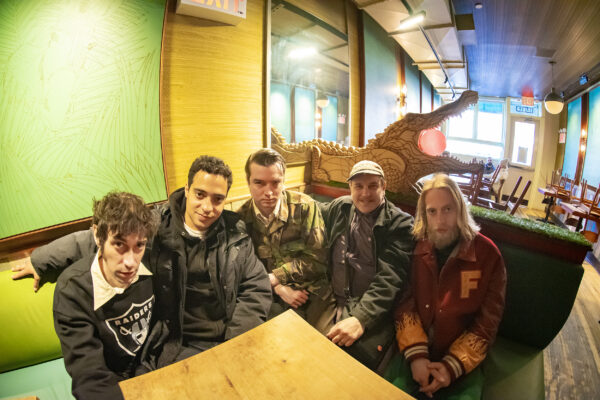If you ask anyone about their first memory of music you will most likely hear answers of a mother’s lullaby or perhaps a nursery rhyme. Ask Ian Astbury, lead singer of the legendary band The Cult, and you get an epic answer.
“Being about two or three, and the Beatles were in Liverpool, in a crowd full of people, walking through the crowd holding my mother’s hand and people screaming was my first encounter of connections. My mom had seven sisters and my dad had three sisters and they were all teenagers during that period so when I was babysat, all I got to hear was the Stones, the Beatles, the Animals, Hendrix, all the music from that period as a little guy,” says Astbury.
With a pedigree stemming from what is arguably one of the most influential eras of music, Astbury drew from these roots while fronting The Cult. His first album, David Bowie’s “Life On Mars,” he purchased the day it came out when he was only 10.
“Bowie is my North Star,” remarks Astbury. “I got thrown out of school for putting blue food coloring in my hair. This kid had brought blue food coloring and said ‘Let’s put this in our hair to be like Ziggy,’ and we walked into the classroom with blue hair and I got sent home.” His mother later marched him to the school and demanded they take her son back on the grounds that it was ludicrous to expel a child for the color of his hair—a rather progressive viewpoint at the time when England was just beginning to embrace a more modern sense of self.
Astbury’s upbringing in a blue-collar family where his mother was a “woman who worked her fingers to the bone to raise her kids,” gave the artist a base of realism to draw from as he embarked upon his musical career. He spent many of his formative teenage years not on the London scene, but in Ontario, Canada.
“Part of the DNA of The Cult is that at the age of 11 all of a sudden I’m in this really diverse, multi-cultural school. My best friend was from Kingston, Jamaica. I had another friend from Turkey.” Going to his friends’ houses and experiencing their home lives that were so different from his own encouraged Astbury to become a citizen of the world at a young age, perhaps readying him for worldwide fame as the lead singer of The Cult.
Reflective on his own life’s journey, Astbury acknowledges that living as “immigrant” in another country gave him a sight to recognize things in the world that might normally be overlooked. Those experiences were catalogued in his mind to use as inspiration points for music. He advises younger artists embarking upon their own creative jaunts to, “Really immerse yourself. What might appear commonplace around you is really interesting. Validation (doesn’t) come from things around you because lots of times it’s in you. Pay attention to your environment.”
Sage guidance from someone who has been at the pinnacle of the music world opening up for rock greats like The Clash and scoring numerous top ten hits on the Billboard charts, yet was once thrown out of a restaurant in Santa Monica because they thought he was homeless.
“I’d just come back from the Himalayas and I had a heavy beard…back from an adventure and a journey in the mountains.” An experience that could strike a blow at an artist’s easily bruisable ego but Astbury humbly admits that, “I never thought of myself as anybody even when I was a somebody.”
This is the fascinating dichotomy of Ian Astbury. You would expect that someone whose music has so thoroughly permeated the culture to have an arrogance about their world viewpoints, but the contrary is true of The Cult’s frontman. While he acknowledges his successes, they do not shape his future. Astbury still has to motivate himself to create even today.
“Sometimes you have to go away for a minute, sometimes you have to go away for a decade, to find that moment again. We’ve had to weave our way through the narrative of the last three albums to get where we are today.” And that particular today is the best place The Cult has ever been, according to Astbury.
The band’s latest album, Hidden City, spins stories that point to a refuge within all of us and perhaps an encouragement to stop looking for fulfillment from society’s approval. The title comes from the Spanish phrase, “La Cuidad Oscura” referring to a ghetto in Buenos Aires, Argentina where the city’s poor reside and are overlooked in favor of the flashier, wealthier neighborhoods.
Hidden City is about an inward, introspective (journey.) I’ve shared some really fragmented stories in there of events like watching the sunset on Everest or being on my hands and knees in a bathroom stall in a club in Paris at 5 am. It’s all woven into, like you said, a tapestry.”
Astbury may reference pulling inspiration for the music from the world around him but the messages he is sending out into the universe are being transmitted through a different filter than most of his contemporaries. While reading an article online or hearing a news story can inspire many of today’s artists to put pen to paper to offer their own editorial, Astbury allows himself to be the main character of his misadventures. He is a journeyman, a laborer of life, who has taken the time to embrace culture and drink in what the world has to offer so he can thoughtfully repackage it into song-form, perhaps making it more palatable for the masses. Astbury does not shove a mantra down anyone’s throat; he cautions and urges by using his own experiences as a template for us to learn from and repurpose into our own medium.
“I’d love to see some of the classification of the culture get broken away,” he says. “The margilization. Like sometimes people pin on The Cult that we’re classic rock, whatever that means, but the way we were coming at it was we’re punk-rock kids who were like fans of post-modern punk rock and New Wave and then discovering Led Zeppelin like it was Joy Division on Sex Pistols.”
Comparing his own musical embarkation point to what an artist faces today, Astbury notes that he had originally believed London to be the epicenter of where success resided but he considers Berlin and Los Angeles as the new host cities of musical potential.
“Los Angeles is an incredibly diverse, vibrant cultural place for cultural refugees. You can come and be whomever you want to be in Los Angeles. We live in a visual-first culture…and having a good understanding of fragmented culture and imagery and how that all plays a role. I think some artists are really good at it. I think the intention is the same. It’s to articulate your inner experience through whatever medium you have available to you and how you put that through your individual filter.”
Astbury’s creative energy is not limited to music. He writes, he paints and most of it never sees the light of day for he believes that an artist must always be creating something.
“Once you give up being curious in your life, that’s a shame. People give up curiosity and their feelings become calcified and they get stuck in a mindset and they can’t accept that things are changing and evolving and fragmenting.”
While Astbury’s career is far from over, (he muses that the band is probably still in Act 2 of their journey,) he does have hopes for the legacy of The Cult that younger artists may take to heart as they strive for greatness.
“As you evolve, you go deeper into your own journey and you come back to find your partner’s gone in a different direction…you’ve got to find that common space again. That’s the ethos of punk rock, DIY and that ethos hasn’t changed. You can achieve anything you want in your life if you put the elbow to the grease and realize that a good idea is one that happens.”
Don’t miss The Cult in NYC at Brooklyn Steel on May 10 – Tickets Here
Article by: Hannah Soule




